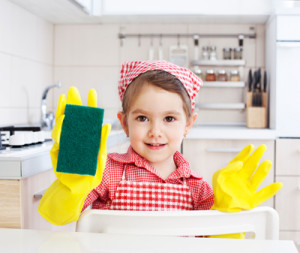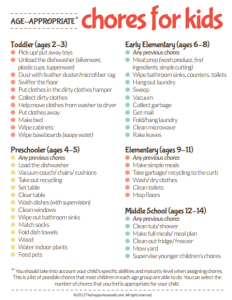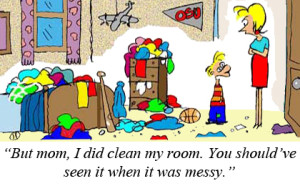Getting kids to do chores is definitely hard. As a Mom, I have had my fair share of screaming, “Please clean up your room!” Or “Please vacuum the hall” and my daughter will reply “I’ll do it later!” and worse, sometimes she never gets on it.
It is pretty simple. kids don’t like doing chores as it is boring and so that is why they resist them.
And in certain Malaysian or Asian families, sons are important to them and there are plenty of instances, let off doing housework.
Sometimes, because it feels like you are always reminding, nagging, or grumbling at your kids just to get them to do their part with the chores, you may decide to let chores slide. It is so much easier to do the jobs yourself.
There are plenty of parents nowadays who are reluctant to be embroiled in continuous arguments for fear of damaging their relationship with their children. Sometimes, there are parents who feel guilty asking their children to help; after all, children these days are already pretty occupied with all the demands on them from school, peers and extra-curricular activities and their parents feel reluctant to add to the pressures. Then there are parents who think their little ones are too young to take on responsibilities, without actually realizing how capable their kids actually can be.

The Benefits of Housework
But though it could be a hassle at certain times, getting the children to do the housework, research indicates that children who helps with the housework have higher self-esteem, and grow up more responsible, and are better cope to deal with frustration and delayed gratification, all of which contribute to greater success in school.
Doing housework gives a child the chance to give back to their parents for all their parents have done for them. The kids can see themselves as important contributors to the family. They get a sense of connection to the family. The children will grow up more capable for having met their obligations and completed their tasks.
One of the most frequently cited causes of over-indulgence stems from parents doing too much for their children and not expecting enough of them. Some would blame having a maid around the house as many Malaysian households have maids. And since they are not being taught the skills of everyday living over indulged children loses the ability to function at age appropriate levels.
For example, 6-year-old Liza goes to kindergarten and is one of the few students who has no idea how to tie her own shoelace. Or Ismail, age 7, goes to his auntie’s house for dinner but does not know how to pour water for himself. Worse, Mei Ling who at age 18 goes away to college, and is forced to stay at the college dorm and she does not know how to tidy her bed properly or do her own laundry. So by expecting our children to complete self-care tasks and to help with household chores, we as parents , are actually equipping them with the skills to function independently in the outside world.
Tell the children housework are the tasks that need to be completed in order for your household to run smoothly and that everyone in the family is encouraged and expected to participate. Young child naturally want to be a part of the family and want to help.
Ideally, you will encourage their participation (even if it takes more work on your part in the short run). By the age of three, youngsters can be assigned their own tasks, for which they are responsible, such as pulling up the sheets on their bed or placing the napkins on the table or sorting the laundry. The size of the task does not matter; it is the responsibility associated with it that does.
For those parents who did not begin a chore regimen when their kids were little, you can still start a plan now. You can take some time to think about what tasks you need help with, what life skills your children need to learn, and what are each child’s interests and abilities.
As your children grow, it is important to re-evaluate your chore plan. Some families use birthdays as natural markers for examining what responsibilities as well as what privileges their children are receiving. Other, naturally occurring breaks that lend themselves to instituting or revisiting a chore plan include the beginning or end of the school year or returning from vacations.

4 Ways to Get Your Kids to Do Their Housework
1) Stop the Show: If your child is not doing his or her share of the housework, you simply stop everything, tell him or her to have a seat and talk to him or her about it. Ask him what he thinks is going on and what’s getting in his way of doing his assigned tasks. Find out what his plans are after he’s finished and try to motivate him toward getting the work done so he move onto what he really wants to do. Appealing to a child’s self-interests—rather than explaining the abstract concept of responsibility or duty—is generally much more effective for kids.
2) Time Your Child’s Performance: Timing is a good way to get your child to comply with doing chores. You can say, “All right, the dishes have to be done in 20 minutes.” If they’re not done in 20 minutes, then your child’s TV time is cut shorter or he or she has to go to bed earlier. Now there’s a cost associated with his or her foot-dragging. The beauty of this system is that you’re not constantly nagging anymore, you’re just keeping time. The next night, you can say, “Do not repeat what happened last night—because remember, you didn’t like watching TV or enjoy going to bed earlier.”
Another timing strategy parents can use is a technique where you motivate kids to compete with themselves. You can say, “Let’s see if you can get it done in 15 minutes tonight. But remember, you have to do it right. I’m going to check.” You can even give them an incentive: “If you get it done within 15 minutes, you can stay up 15 minutes later. Or you can stay online 15 minutes more.” So then it becomes more exciting and stimulating for the child. And while your child won’t lose anything if he or she doesn’t get it done, they’ll gain something if they do. That kind of reward system is always preferable to one in which the kid loses something, because it’s more motivational and less punitive—you’re giving your child an incentive to do better.
3) Giving Kids an Allowance: It is a good idea to get your child’s allowance hooked into their housework—and to the times when your child fails to complete his tasks or has to be reminded to do them. So for example, if your child has to be told more than once to do his or her housework, he would lose a certain part of his allowance—let’s say RM0.50. And every time you need to remind him or her, he or she loses RM0.50. It is also appropriate to give that part of his or her allowance to a sibling who does the chore instead. This way, you’re not working on the chore, you’re working on the communications process, as well as your child’s motivation.








TrackBack URL
https://familybloggerz.com/how-to-get-your-kids-to-do-housework/trackback/